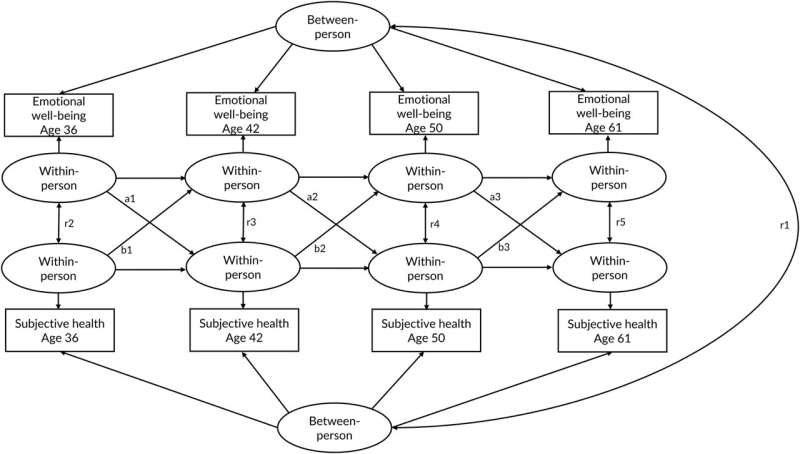This article has been reviewed according to Science X's editorial process and policies. Editors have highlighted the following attributes while ensuring the content's credibility:
fact-checked
proofread
Emotional well-being and subjective health are linked during adulthood, shows study

A study conducted at the University of Jyväskylä, Finland, showed that mood and life satisfaction are linked to people's experiences of their health. Emotional well-being was found to predict subjective health up to 11 years later. And vice versa, better health predicted life satisfaction later in life. The paper is published in the journal Psychology & Health.
Researchers often make assumptions about the links between emotional well-being and health. It is often thought that a decline in health can lead to a decline in well-being. However, it is also possible that the link is the other way around, that people with higher emotional well-being perceive themselves as healthier.
Exploring such causal relationships requires a longitudinal study design, on which the analyses of this study were based. The study aimed to examine the associations between emotional well-being and subjective health assessed at different ages during adulthood (ages 36, 42, 50, and 61). Emotional well-being was measured by life satisfaction and positive and negative mood. Subjective health was assessed in terms of general self-rated health and the experience of various symptoms such as headache, muscular pain, and tiredness and weakness.
"The results showed that fewer symptoms at age 36 or 50 were associated with higher life satisfaction 6–11 years later," says doctoral researcher Emmi Reinilä from the Gerontology Research Center and the Faculty of Sport and Health Sciences. "In addition, a lower negative and higher positive mood at age 42 or 50 predicted lower symptoms 8–11 years later."
The link between emotional well-being and subjective health appears to be bidirectional. When people experience fewer unpleasant symptoms, their satisfaction with life can increase. On the other hand, a more positive mood may contribute to experiencing fewer symptoms.
"We also found that a higher negative mood predicted better self-rated health, which was contrary to expectations," Reinilä says. "This may be explained by the possibility that, for example, worrying may in some situations lead to activities beneficial to health, such as seeking health care.".
The data used in the study were from the Jyväskylä Longitudinal Study of Personality and Social Development, which has followed the development of the same people for more than 50 years. The most recent data collection (TRAILS) was carried out between 2020 and 2021.
More information: Emmi Reinilä et al, Longitudinal associations between emotional well-being and subjective health from middle adulthood to the beginning of late adulthood, Psychology & Health (2023). DOI: 10.1080/08870446.2023.2261038




















